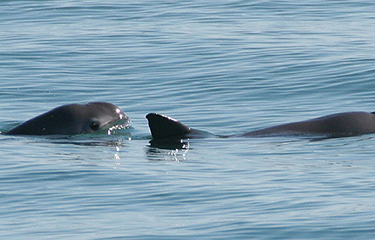The Convention on International Trade in Endangered Species of Wild Fauna and Flora (CITES) lifted sanctions against Mexico after the government met with officials to create a plan to protect the critically endangered vaquita and the endangered totoaba from illegal fishing.
On 27 March, CITES sanctioned Mexico for its failure to take action to protect the two endangered species, a move that would prohibit Mexican companies from exporting 40,900 wildlife products protected by CITES against overexploitation through international trade, including more than 3,000 commercially exported items including crocodile and snake skins, mahogany wood, pet reptiles and spiders, orchids, and cactuses.
CITES sanctioned the country after it failed to submit a compliance action plan to protect the two species that met CITES standards. CITES directed Mexico to prepare a compliance action plan in November 2022 to address its shortcomings in regulating the capture and trade of totoaba and the bycatch of vaquita – a cetacean species with less than a dozen individuals remaining in the wild. However, the plan that the country submitted on 27 February, 2023 didn’t do enough to keep the two species safe.
Since that time, according to a new notification from CITES, a “high-level delegation from Mexico” visited Geneva from 27 March to 30 March 2023 to worth with the CITES Secretariat to discuss ways to bring the action plan up to international standards.
“The Secretariat staff worked closely with the Mexican representatives in revising and further elaborating the compliance action plan on Totoaba (Totoaba macdonaldi),” CITES said in its notification. “The Secretariat notes the swift action taken by the Government of Mexico, as well as the commitment and dedication demonstrated by the high-level delegation while working with the Secretariat.”
With the updated compliance plan, CITES said, the recommendation to suspend all commercial trade in CITES-listed species was withdrawn “with immediate effect” on 13 April.
“The Secretariat found that the plan submitted includes all the essential elements required and assessed the plan to be adequate,” CITES said.
Soon after, on 14 April, the U.S. Fish and Wildlife Service announced that the U.S. will also resume normal trade operations with Mexico following the update.
“The CITES trade suspension with Mexico is withdrawn,” the service said in a notice. “The United States will resume normal trade operations with Mexico related to CITES species, effective immediately.”
Central to Mexico’s plan is efforts to reduce the use of gillnets in habitat occupied by vaquita. Poachers use illegal gillnets in the Gulf of California to catch the endangered totoaba, a species that contains a swim bladder highly valued in China. Those gillnets also catch the critically endangered vaquita, who get caught in the nets and drown.
While trade has been resumed and CITES has been satisfied, some experts with conservation organizations have remained skeptical that Mexico will be able to live up to its promises.
Center for Biological Diversity representative Alejandro Olivera told the Associated Press Mexico has made similar promises in the past and failed to live up to them.
“The Mexican government has been promising this since it published a plan in September 2020. I don’t know what the difference is going to be now,” he said.
Mexico’s plan, Olivera said, is similar to plans it has made in the past that failed due to lack of funding or action.
“There is still shrimp fishing with illegal nets, and the key points for launching and docking boats are still without inspectors,” Olivera said. “Right now, everything is on paper, and the vaquita is on the brink of extinction, so that all these measures should be implemented now, urgently.”
Photo courtesy of NOAA







